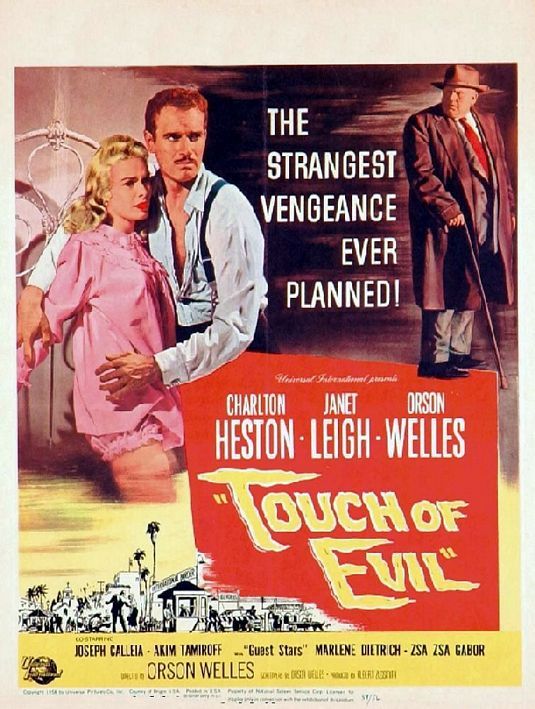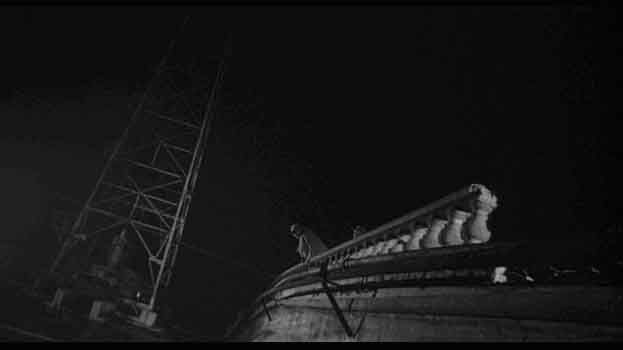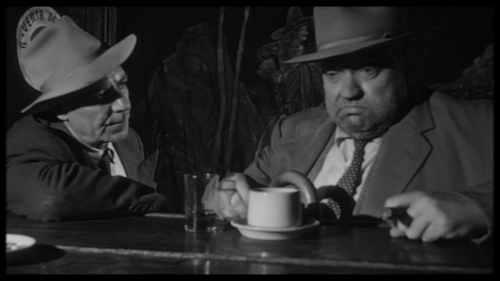Thursday, November 29, 2012
Touch of Evil
Touch of Evil
1958
Director: Orson Welles
Starring: Charlton Heston, Orson Welles, Janet Leigh
Generally considered the last true classic film noir (as it was the last one made before the term was coined, everything that followed would be mindfully neo-noir), Touch of Evil is completely and utterly embodied to me by one of its main characters. Hank Quinlan is fat, bloated, sweaty, confused, and corrupt. These adjectives most definitely apply to the general tone of the film as well.
Miguel “Mike” Vargas (Heston in obnoxious brownface) is a Mexican narcotics cop working to take down the infamous Grande family in a border town. When an American business man is killed by a car bomb deposited in Mexico but detonated in the US, jurisdiction gets confusing. Vargas is helping on the case, but American veteran cop Quinlan (Welles) takes charge of the case. Quinlan is stubborn and untrusting of Vargas, who is as straight edge as it’s possible to be. Things aren’t helped when Vargas’ new wife, American Susan (Leigh) is kidnapped by the Grande family and psychologically tortured in order to tarnish both her and Mike’s reputation.
Although this is certainly a film noir, I think Touch of Evil more than paves the way for the surrealism observed in international cinema in the sixties. I kept thinking to myself that Federico Fellini must have seen Touch of Evil when it came out and said to himself “YES. THAT. I MUST MAKE FILMS LIKE THAT.” So much of La Dolce Vita seems based on the visual and narrative style of Touch of Evil that it’s uncanny. Both films share a random jazz/pop score (that drove me nuts, by the way), people continually talking over one another, a tendency to set scenes in open, unattractive places, and phenomenally stark high contrast lighting. Add in a hefty dose or three of megalomania, and there’s more than a passing resemblance here. Realistically, these films differ most in the one thing that matters least – the plot. Plot is not the point of La Dolce Vita, which is far more a character study and less about actual events, and plot is hardly the primary focus of film noir, which is much more about seedy characters interacting with one another in a shadow world. The central mystery of Touch of Evil is resolved at the end in a total throwaway moment; it didn’t matter who planted the car bomb by the end of the movie.
While I can easily see how Welles’ Touch of Evil MUST have influenced Fellini, I must now say with a grimace that I don’t really like Touch of Evil very much. I’ve decided that it’s probably BECAUSE it reminds me of Fellini, and I really don’t enjoy Fellini. While I love Orson Welles and really adore *most* of his films throughout his career, there is something very off-putting to me in this one. I feel like I need a shower after watching it, it’s that dirty and greasy and grimy. Yes, noir is supposed to be like that, I agree, but this one is different somehow. It’s nasty in an unpleasant and frankly gross sort of way. There’s a difference between the character you love to hate and the character you just plain hate, and Touch of Evil falls in into the latter category for me.
Additionally, there’s a sense of chaos to the film that is hard for me to deal with. I’m honestly not certain if this was intended, or if this is a result of the hatchet job the studio did with Welles’ original print. Between Heston’s overacting, multitudes of characters (many of whom look pretty similar), some absolutely ridiculous caricatures (consider the Night Man at the remote Mirador motel), and people ceaselessly talking over one another, it’s difficult for me to really find the center of the film. There are so many threads being pulled in opposite directions, it’s one of those “wait, who’s that and what just happened?” movies. I mean, I get the crux of the general plot, and plot is, as I myself say above, not the main point, but the film feels a little random to me.
Well, maybe random isn’t quite the right word. It doesn’t feel random; it feels, more than any of Welles’ other films I’ve seen, like an ego vanity project. Like Welles really wanted to put to the screen the vision he had, and to hell with anything else. It’s frenetic and lurid and gross and random and insane. That is, it’s Fellini, before Fellini became Fellini. And that’s why I’m not really a fan, despite the fact that I love films noir and I love Welles. This one is a bit too far off the deep end for me.
I know I risk any small amount of cred I may have had for saying the above, because this is considered one of “those” movies, those “Top Ten” movies, but I just can’t get my head around it. I concede that I can understand why it’s considered such a big deal; I mean, this is Welles, after all, so the photography is gorgeous and fantastic and full of wow moments. And his Hank Quinlan is one of the evilest evils to ever evil and Welles delivers an amazing performance. And there are a myriad of race issues at the heart of the film that were certainly capturing the civil rights movement to come in America.
But I’ve tried this one on a few times now, and each time comes up the same. I guess I understand why it’s a big deal, but I won’t ever choose to watch it.
Which, as I said, is really weird to me because I love noir and Welles. You’d think this would make my brain explode. It does not.
Arbitrary Rating: 7/10
Labels:
1001 movies,
1950s,
1958,
7 out of 10,
american,
touch of evil,
welles
Subscribe to:
Post Comments (Atom)



Boy, do we disagree on this one. In fact, the only thing that bothers me at all in this film is Heston in brownface. Otherwise, I think this is nearly flawless, from the fantastic opening sequence through to the end. It has the right amount of grime and just enough moral ambiguity to make it one of the truly great films noir in my book.
ReplyDeleteBut hey, we can't always agree, right?
No, that would be no fun at all.
DeleteWhen a "great film" falls short for me, it's always a little hard for me to admit, but I just can't really like this one. I know there's moral ambiguity in this tale, but I'm just so distracted by all the random crazies (really, what on earth was Marlene Dietrich doing? and that night manager?) populating the periphery of the story that I can't really dig my teeth into said ambiguity. And the soundtrack drives me nuts.
I get that. I say own it--hate the classic film that you hate, but hate it honestly. You might upset some people, but any really serious film person will accept your well-reasoned and argued position.
DeleteBut the thing is, I don't hate it. I really don't. I can appreciate it, but I don't love it, and I don't think it's flawless, which is pretty much what everyone else thinks.
DeleteWell, you can't hate it that much if you still gave it a seven out of ten. That's a movie worth recommending in my rating system (essentially 3.5 stars out of five for me.)
ReplyDeleteI'm with Steve in that I just couldn't buy Heston as a Mexican, although not because of the makeup, but because he was CHARLTON HESTON. I just couldn't see him in this different a role.
I'd say I fall in between you and Steve. I liked the film and would recommend it. I haven't ever watched it again, though.
I have to admit, I had never connected this film to Fellini. I'm with you in that Fellini movies don't generally do much for me (other than Nights of Cabiria and maybe Amarcord). I agree that La Dolce Vita didn't have much of a plot (and 8 1/2 even less so). I disagree that Touch of Evil didn't have much plot, though. I believe I understand where you are coming from, though. The thing that initially appeared was going to be the central mystery of the film - the explosion - turned out to be just a device to drive the plot. This is much like the statue in The Maltese Falcon and other noir movies.
And that's exactly it - I DON'T hate it. As I say above, I really don't, and I know myself by now, if I hated a film, I'd lay into it. But I don't hate Touch of Evil. I like Welles' performance, the opening shot is awesome, and really, as long as we're dealing in the noir universe, I'm interested.
DeleteBut I don't love it. I don't even like it all that much. I'm just ambivalent about it. I get it, I get why it's a big deal historically speaking, but it's not a big deal to me personally. It's not a part of my Essentials Collection.
And I *do* recommend it, but I'd only do so to the budding film student/historian. This is worth seeing to them, but I wouldn't recommend it to the casual movie fan.
Enjoying the above conversation after Googling, what to me was, a rather improbably question: "What did Felini think about Touch of Evil"? I was led to this because it came to me tonight while watching TofE that it was very Felini-like. It's great to see I'm not alone in this impression and really liked Siochemio's comment that: "Federico Fellini must have seen Touch of Evil when it came out and said to himself “YES. THAT. I MUST MAKE FILMS LIKE THAT.” The comparison to La Dolce Vita looks apt and I'll re-watch it again. Although Siochemio can't really get behind TofE, it's La Dolce Vita that, for me, doesn't really rise to the level of it's mythic fame. Maybe it's because that it seems not to have aged as well as one would want; although I don't think 8 1/2 has aged at all, it's still a fantastic film. Anyway, thanks for bringing Welles and Fellini together. I'll have fun running all this sophisticated analysis on the more receptive members of my family who think I know something about 'old movies'.
Deletehttp://www.rayban-sunglasses.uk
ReplyDeletetoms outlet store
adidas nmd runner
michael kors outlet clearance
nike roshe one
http://www.tiffanyand.co.uk
lacoste online shop
huaraches shoes
cheap jordans online
michael jordan shoes